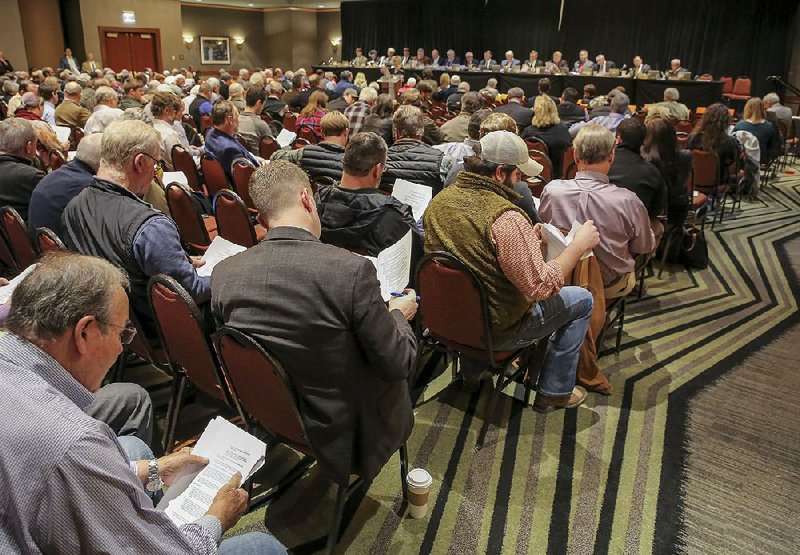The state Plant Board on Thursday levied fines of nearly $39,000 against 24 farmers for violating pesticide laws, mainly those related to dicamba use.
The board addressed 46 complaints, none of which were deemed eligible for fines of up to $25,000 per violation now allowed by Arkansas law for "egregious" violations.
The board last month fined a Missouri farmer $105,000 -- including $25,000 each on four violations -- for spraying dicamba on Arkansas fields last year during a period that the herbicide was illegal for in-crop use. It was the first time the board issued $25,000 fines for egregious violations.
The board on Dec. 6 will hold a formal hearing on another case that is eligible for the $25,000 fines.
A few of the 46 case files concerned complaints of dicamba damage in 2017, when dicamba's in-crop use was still being allowed but before the Plant Board implemented a midseason emergency ban. The maximum fine for violations then was $1,000.
The board on Thursday approved $1,000 fines on each of 25 violations, up from the $300-$900 range of fines that had been recommended by staff in "consent agreements." Seventeen farmers involved in those cases never responded to Plant Board letters outlining the fines recommended by staff.
The biggest total fine Thursday was $5,000 against a farmer for five violations. Staff members had recommended a total fine of $2,700.
All of the fines approved this week can be appealed. Fines were levied for such violations as spraying during a dicamba ban, not having a license to spray pesticides, spraying in a manner in which off-target movement occurred, and for not providing spray records to Plant Board inspectors.
The board also approved warning letters to 16 farmers for 22 violations. Repeat violations within three years can result in fines.
Dicamba complaints have rocked the board since 2017, the first year new formulations of the herbicide were allowed for in-crop use, or once plants have emerged, on cotton and soybeans that are dicamba tolerant. Other varieties of soybeans and cotton, other crops and vegetation, however, can be damaged by the herbicide.
The board has received some 1,400 complaints of dicamba damage over the past three crop years, including about 200 this year.
In debating the fines, Plant Board members were skeptical that many farmers would ever pay up but noted that the board can now send a collection agency after those who don't. Gov. Asa Hutchinson earlier this year authorized the board to hire a collection agency to pursue unpaid fines.
From Jan. 1, 2016, to Oct. 22 this year, the board has levied $147,700 in penalties, according to the state Department of Agriculture, the parent agency of the Plant Board. That total didn't include the $105,000 in fines against the Missouri farmer.
The department said it has received payments totaling $72,250 as of Oct. 22. Not all payment due dates have expired, the department said. Fines are due 45 days after being levied.
The Missouri farmer hasn't yet paid those fines or appealed the Plant Board's decision to a circuit court in Arkansas, as allowed by Arkansas law.
Arkansas law requires fines of up to $1,000 go to Plant Board scholarship programs.
On larger fines, the first $1,000 goes to the Plant Board scholarships. Sixty percent of the remaining funds goes to Plant Board scholarships, with the rest going to the University of Arkansas Cooperative Extension Service.
The board will hold a public hearing at 9:30 a.m. Dec. 11 to consider rules for dicamba's use next season. The meeting will be in a ballroom at the Embassy Suites hotel in west Little Rock.
The board has recommended a May 25 cutoff on dicamba's use next season. That's the same date used for this year. A public comment period on the proposed rule runs through Nov. 30.
Business on 11/15/2019

